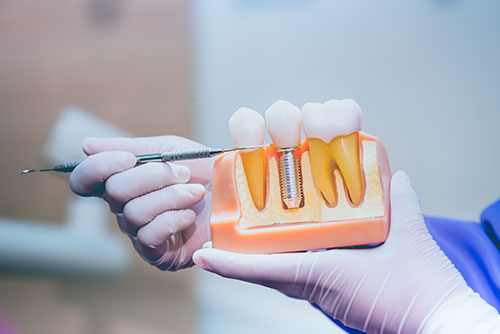Dallas Center for Oral & Maxillofacial Surgery
History Of Dental Implants
The history of dental implants is an interesting story in the chapter of oral surgery procedures. At Dallas Center for Oral & Maxillofacial Surgery, we use the most up-to-date, advanced approaches to implementing dental implants as a permanent solution for tooth loss.

Dental implants are screw-like titanium posts that are used to replace tooth roots. They serve as a sturdy base for permanent or removable replacement teeth that are designed to match your natural teeth.
Dental implants can be fused to the jawbone over time and feel just like natural teeth in the long run. They allow you to eat and speak normally without any difficulty.
-
One of the earliest versions of dental implants was used in ancient China in approximately 2000 BC. It was a usual practice to replace missing teeth with carved bamboo pegs.
The first ever recorded metal tooth replacement was found from the body of an Egyptian king who ruled around 1000 BC. A copper peg was found to be hammered into his upper jawbone. However, it is likely that it was attached inside his mouth after his death, because the procedure would have been extremely painful at that time when anesthetics had not been invented.
In 300 BC, a fabricated iron tooth was found in a Celtic grave. The false tooth is believed to be hammered in place after death for aesthetic reasons in this case as well.
Only 2000 years back, people used to attempt to replace teeth using a tooth from an animal or someone belonging to a lower social class. These implants were mostly rejected as they would be vulnerable to decay and infection.
Around 600 AD, Mayans used to fix shell pieces into the lower jaw, which is the closest evidence of the first ever dental implants. According to the radiographs of Mayan mandibles during the 1970s, bone growth around the implants was similar to contemporary implants.
In 1886, a doctor fixed a porcelain crown on top of a platinum disc, which turned out to be an unsuccessful experiment. This was because the body tends to reject foreign elements. For a successful dental implant, it is important for the implant material to fuse to the jawbone. -
Contemporary dental implants were actually created by accident. In 1952, Swedish researcher, Per-Ingvar Branemark, observed that he was unable to remove a titanium piece he had placed in a rabbit’s leg to study how blood circulation impacts bone healing.
He found out that the titanium had bonded with the bone and was unable to get it detached. This special trait of bone integration is known as osseointegration. The discovery regarding titanium made Branemark conclude that the human body was compatible with the long-term presence of titanium, making it viable for use as a base for artificial teeth.
Today, with rapid advancements in dental technology, implants can be created in a variety of shapes and sizes to match your natural teeth and dental implants now last longer than before. The surfaces of contemporary dental implants offer a much more natural look and feel as compared to their predecessors. If you have a tooth missing and require an implant to restore your smile, call 972-733-0414 today to schedule your appointment.

Patient Feedback
Read More Feedback >
